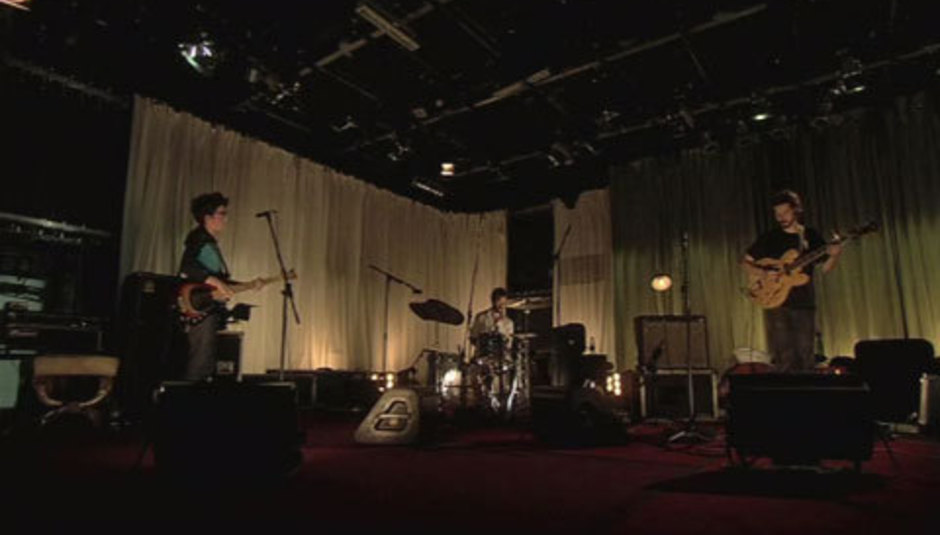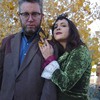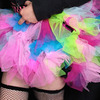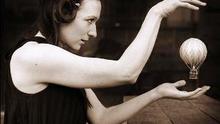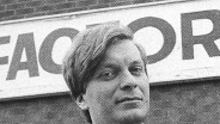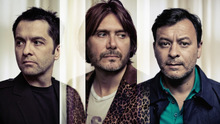You've probably heard of Nigel Godrich. He's been recording bands in studios for a number of years (his C.V., of course, includes Radiohead, Air, Beck, Paul McCartney, Pavement and R.E.M.), but you might not be so familiar with his "hobby", From The Basement, where he takes bands and records their performances for broadcast.
It's a simple premise: film bands playing to cameras. No audience, no presenter. This back-to-basics approach has attracted the likes of Beck, The Fall, PJ Harvey, Radiohead and Sonic Youth to perform on the show over the past couple of years, where it's been broadcast on Sky Arts.
But from next week, all the From The Basement sessions will be available to watch online over at FTBLive.com, and, to celebrate, they've bagged the first UK live performance from Jack White's new all-star side-project, The Dead Weather (also featuring The Kills' Alison Mosshart, QOTSA guitarist Dean Fertita and The Raconteurs' Jack Lawrence), which goes out live on Monday June 22nd at 9pm. You'll also be able to watch a live stream on this very site.
We spoke to the show's creator about this, and other stuff...
DiS: For people who don't know, what's the concept behind From The Basement?
Nigel Godrich: It's an anti-idea, really. It's an attempt to get rid of all the extra stuff that has somehow arrived over the last thirty years in the way that people film music performances for TV, inspired by older, 70s era stuff like The Old Grey Whistle Test or obscure German music shows - they always seem to have this directness to them... when you look at old footage of, say, David Bowie or Curtis Mayfield or Bill Withers, it's really quite something. It's just a labour of love, really, an elaborate hobby, just because I know so many people in great bands. So, essentially, you don't have an audience or a presenter, you just get the band and they're performing for the cameras rather than an audience in the studio. You don't have any agendas, it's supposed to be as transparent and neutral as possible.
DiS: So that's why you decided to break with that traditional format?
NG: Yeah. When you have an audience in the room the people who are playing will be playing to that audience. It's a barrier, if you like. If you watch the Whistle Test performances, where they didn't have the facility to have an audience, what you get sometimes is this real direct connection between the performers and the cameras, which I love. If I had to put my finger on it, that's one of the things that I really enjoy, and it doesn't happen anymore. It's all about having a sympathetic environment where people feel comfortable enough and relaxed enough to give good performances under those circumstances. I'm a music guy, I'm not a TV guy, and I find TV studios quite frightening and alien places, full of people who don't seem to be doing anything - so I can put my oar in and try and create a more music-friendly environment, because I'm in charge of that end of things, and hopefully bring some great performances out and capture them in a way that gives a good record of the state of their art.
DiS: Don't you think it's strange how the quality of televised performances has decreased since those days you spoke about? Why do you think that is?
NG: I really don't know. My theory is that MTV came along in the 80s, and people shaking their cameras, making fast-cuts... Technology changes. People didn't have video recorders in the 70s. The whole way we ingest media has changed, to the point now with YouTube where we choose every single thing we look at. In the midway, MTV in the 80s was a big deal. Everybody watched it, so there was a market for promo videos and suddenly they became the biggest business in the music industry. You spent more on your video than you did your album, and it wasn't frowned at at all. It also changed the way people thought people wanted to see music, it was the start of the attention-grabbing, assault-on-the-senses approach to shock your viewer so their attention didn't get drawn anywhere else. As an aside, it became more about the delivery and the device, the stupidly over-the-top presenter trying to relate to 'The Yoof' and something in the middle got lost, which was the idea that there was a musician in the middle trying to perform. The other thing is that now, the music business is in real trouble. There's no money, so people try to react, they act in very strange ways when they're being threatened. Noone's prepared to take a risk, everything's about trying to push things, thinking 'Who's paying for this?' and the people who are paying for it want a return on their investment. It's the worst set of circumstances for any creative thing... music performances on television, who wants to spend money on that, because it doesn't draw enough attention? So it's turned into a sort of add-on to chat shows and all that sort of thing. Me, I'm more of a fan, and it's just what I would like to see if I turned on the telly, and having the opportunity to do that... it's just really fun.
DiS: So have performers responded well to that concept?
NG: God yeah. I've been around bands all my life, and the joke is that everyone hates doing TV promo, they hate it because it's so uncomfortable. You never get a chance to say, 'Stop, something's wrong' and sort it out and start again. But you can with us! People love it. We've got The Dead Weather on Monday, and Jack [White, Dead Weather drummer] told me that the first one we did, which was The White Stripes, that that was his favourite bit of TV that's he done with them. And that means a lot to me. People who've seen it have been really enthusiastic. It's been slightly frustrating that we've done these two series which have been on Sky Arts, which is a great channel, but not everyone has access to it, and the exciting thing now is that the footage is going to be put online so you can see it all, as of this week, maybe next, clips from every show will be available.
Video: The Dead Weather 'Hang You From The Heavens' (Live @ The Bowery, NYC)
---
DiS: And The Dead Weather one on Monday, that's going out live...
NG: It is. We're doing a recorded section and then a live section in the evening, at 9pm on Monday.
DiS: How did that come about? Is it because you've worked with their other bands in the past?
NG: Basically, yeah. We were planning on doing this, and then the opportunity came about because we found out they were going to be around at exactly the same time. And Jack's a big supporter of the concept, he really gets it, so he's really happy to put himself in our hands. It's fantastic, couldn't be better. We're going to get a performance which I'm sure is going to be captivating.
DiS: It's also their UK debut. Obviously people know their other bands but as The Dead Weather they're a bit of an unknown quantity...
NG: Exactly. I've not seen them play live myself yet but I'm sure they're fantastic. I've worked with them all individually, and I'm super happy that it's happening.
DiS: Talk us through what you'll do on the day. How much preparation/set-up goes into it?
NG: Basically, they set-up how they would be onstage, or in the round, it's entirely down to whatever's comfortable for them. We'll have some kind of soundcheck, to make sure everything's working, some general banter, a cup of tea, and then they'll play a couple of songs, I'll check the balance of the sound and everything, then off we go. They choose what they want to play, it can be whatever they want, and I'll give them a bit of help if they need it - if things could turn out better, I'll certainly let them know. We're going to record that segment in the afternoon, and then it'll all be set up and ready to go for the evening, essentially as a live broadcast. I hate to call it a webcast because I feel it's a bit more than that.
DiS: What are the biggest challenges associated with capturing a live performance in this fashion?
NG: For the live performance, obviously things can go wrong but recording a band for television, it's an extremely luxurious situation. We can stop, record things again, we don't have to answer for some other production as it's not part of another show... we can do what we like. For me, setting up a band in a room and recording them is essentially quite easy, and a lot of fun. If you're making records and you've got a band who can play their songs, that's what you do. Get them to search for those performances, that's the key. The biggest challenge is setting up that environment for them to perform well. Technically, it's not really an issue.
Video: Beck 'Landslide' (From The Basement)
---
DiS: How many people will be involved in the production of the broadcast on Monday? I read in a previous interview you wanted to keep the number of people on set to a minimum to make it as comfortable an environment to the performers as possible...
NG: It's incredible, what you normally find is people just standing around on the floor of the studio. I'd ask, 'What does that guy do? What do they do?' and it's like, 'Technically, they don't have to be here'. So what I tend to do is get the Floor Manager to clear people out, unless bands say they want to have a couple of people around. I'm not sure exactly how many people are involved in the broadcast but it seems like quite a lot to me! From my end of things, it's just me and a couple of people helping me.
DiS: It's being streamed live on the day to a few other locations - Manchester, Brighton, London... in terms of technology, how is that achieved?
NG: I don't know the details, I let someone else take care of that. It's going to be streamed via our site. There's a few in-stores, one's going to be Rough Trade East because there's a gig on there, and they're set-up to watch it live. There's also this thing with Nokia, where they're streaming it to their latest phones, which is kind of incredible. That's very new.
DiS: What's the sound quality going to be like on that? I'm sure that, as a producer, you're very fussy about that...
NG: It's reduced slightly but I'm sure it's going to be good. They were doing lots of tests last week... I wasn't there, but apparently it looks amazing. I'm sure it'll sound fine. I am a producer, but I also listen to MP3s all the time, and I don't have a problem with that kind of stuff. I grew up listening to cassettes! The important thing is the music and the energy behind the performance. I'll do my best to make it sound good in that format anyway!
DiS: Who's on your current wishlist of acts you'd like to have on the show in the future?
NG: There's a few things lined up by I'm always very reluctant to talk about things like that because they may not happen, and I may curse them. Or upset people involved. So I'd rather not speculate. But the good thing now is that we're quite free to do things when we want to, before we were doing things in TV blocks, which was quite difficult. It took us a year to get the material together before it first came out. Now, we're going to concentrate on doing it online, so we can film stuff when people are around. With festivals coming up a lot of people are coming into town, so it's giving us a lot of opportunities.
DiS: How much of your time is invested in this? Are you still producing a lot, or has that taken a backseat?
NG: It's a day shooting and maybe a day mixing, so relatively speaking it's nothing. This is fun, it isn't a career move - just a hobby.
Video: Radiohead 'Myxomatosis' (From The Basement)
---
Speaking of your day job, people perhaps forget the amount of great stuff you've worked on in the past and think of you as "The Radiohead guy" - is that something you mind?
NG: I don't mind. Honestly, my relationship with Radiohead is unlike my relationship with pretty much anybody else I've worked with. Having said that, they are all relationships... I tend to work with a bunch of people, and they're all my friends and people I like to work with. And certainly I've invested the most of myself into Radiohead, and I've spent by far more time with these guys than anybody else. But I don't mind, I love the band and get an anwful lot out of working with them. There are worse trains to be on!
DiS: And I understand they've started work on the follow-up to In Rainbows?
NG: We're always working, that's the thing, it's just in and out of the studio when we have time. What it's going to become, god knows. There's nothing specific, there are no agendas. It'll be what it'll be, [and it'll] emerge and reveal itself in due course I'm sure. I can't really tell you anything that's useful, let's put it that way. It's nice to have the luxury of not being able to think about [adhering to deadlines], and work without a goal, really.
DiS: How has working with the band changed over the years? How do they compare now to when you first started working with them on The Bends?
NG: You know what? I don't really want to go into Radiohead right now. I also have to go very soon. It's like... I dunno, I can't. Another day, maybe...
DiS: Ok, sure. Can I ask you about another project? I understand you're doing some stuff with Gaz and Danny from Supergrass, as The Hot Rats. How did that come about?
NG: Yeah. Essentially, we're friends and when their bass player [Mick Quinn] broke his back they went out as a two-piece [The Diamond Hoo Ha Men] to promote their last record. They did a cover of 'Beat It' by Michael Jackson as part of their set because they were short of things they could do, and we were just larking around and we thought it'd be fun to record it, so we went into the studio. And it was ok, but we just realised that it wasn't the greatest song to do. We started doing some other covers, better songs to work with, and just spent a couple of weeks and made this weird, rocky, psychedelic thing. It's all finished and done, and they're just starting to do some gigs now.
DiS: So your role in that is production rather than performance? It wasn't really clear from the things I've read...
NG: I play bits and bobs on the record, but I'm not playing with the band live. I think somehow people think I'm going out on tour with them, which is pretty funny for me. An honour, in fact! But unfortunately, no, I won't be performing with them.
Video: PJ Harvey 'The Devil' (From The Basement)
---
DiS: Those are all my questions, but I have got some other from our messageboards that people have been asking. Do you have time to answer a few of those?
NG: OK, try me.
DiS: Thanks. Right, somebody wants to know what your favourite performances on From The Basement have been?
NG: White Denim were amazing, a band I didn't really know anything about. I'd checked them out but they were not at all like I expected them to be when they came in - they did a very, very electric performance. I love Polly Harvey, she did an amazing one for us. The Fall were great. The Radiohead stuff turned out really well, I thought. Those are the highpoints [I use] when I want to show people. Some great moments in Sonic Youth as well. So many!
DiS: How many have you done in total now?
NG: We've done what amounts to twelve hours of stuff... twelve one hour shows. Plus some extras that we haven't actually put out yet, but [they] will come out.
DiS: Another reader wants to know if you'd produce Silver Sun again. Apparently there's new material...
NG: Oh really? Laughs. Are we still friends? Yeah. I love James [Broad, Silver Sun mainman]. I had a really amazing experience with them, we were all young and stupid and footloose. It was enormously enjoyable. But James' whole thing is that he does it at home, himself. That's his vibe. If you're asking me if I'm going to work with them again, the answer's 'No', but I think he's great. So 'No, I'm sorry'.
DiS: The next one is 'Which producers, if any, had a massive effect on the way you work?'
NG:Absolutely. There's a few. There's the guy that I learned from directly, his name's Phil Thornalley. He was in The Cure for a while and produced an album for them, Pornography, but he also did a lot of stuff in the 80s... it's weird, it's not necessarily to my taste but I learned my craft off him. He worked with, like, Duran Duran and all sorts of people. The producers who inspired me are basically George Martin and Trevor Horn, who are both my heroes. Trevor Horn is my everything... I love that guy. That's the thing that really made me sit up and listen. And George Martin because he's the guy who invented the job. If it wasn't for him... He's the archetypal record producer. And also Steve Lillywhite. I think he's massively underrated, a really important person who's still around, and working.
DiS: There's a sub-part to that question... Have you read Revolution In The Head, a book about George Martin and The Beatles?
NG: I have, yeah. I've read probably every Beatles book that's out and about. There's a good one by... ahh, what's it called? It's by Geoff Emerick, it's called In My Life or something. I dunno if it's even released in England, but it's very interesting. [We think he means Here, There and Everywhere: My Life Recording The Music Of The Beatles]
Video: Sonic Youth 'The Sprawl' (From The Basement)
---
DiS: Ok, modern production techniques... someone wants to know what your views on auto-tune and things like that are?
NG: Laughs. Oh my god. Err... What are my views? You can't stop progress, son. It's a tool you can use to great effect if you decide to use it for something it's not supposed to do! Laughs. But in terms of in pop music? I'm sure my views are very similar to the person who asked the question.
DiS: Following on from that in a more general sense, do you think things like ProTools, the fact anyone can 'be a producer', is that a great thing or does it hold people back by fooling them into thinking it's a case of using a piece of software rather than learning a craft?
NG: In terms of tools, it's incredible what you can do. Your possibilities are exponentially more, but unfortunately the end result hasn't proved itself to be worthy of that. I'm generally disappointed by the reaction to new things coming out. In reality, what happens when a new plug-in, like auto-tune, is invented... I feel like it affects your method, the way you approach things creatively, generally negatively. Sometimes it's better when you have less tools, less options. It makes you work harder and think harder. But I think that's the age that we live in, democratising anything doesn't necessarily improve the quality of what comes from it. There'll always be good things that come from it, someone will be able to get their hands on something they wouldn't have been able to get their hands on before, and they will do something amazing. It's just about finding the good stuff now.
DiS: Going back a bit further, someone wants to know about the recording of Pavement's Terror Twilight. How was the atmosphere in the studio? Did you pick up on the tensions within the band during the making of the record?
NG: It was pretty well understood that Stephen [Malkmus, Pavement frontman] wanted to try and make a record with the band, with everyone playing, because generally, previously, he'd done quite a lot of the recording itself. The idea of getting a producer in was to make a 'band' record. There wasn't tension in the air, but they were trying to do something different and it had to go somewhere. I had a great time with them, we all had a lot of fun doing. But I guess the proof of the pudding was that that was it, after that he just decided he wanted to go and do his own stuff.
DiS: Another question about a past project now... I've been asked to ask you about the sessions you did with The Strokes. Someone wants to know how far they got, and if they still existed in any sort of form?
NG: Laughs. I did come across a couple of things the other day... To be honest, we didn't even really get started. You know, the problem there was that me and Julian [Casablancas, Strokes singer] are just too similar, we're both control freaks. He wanted to do it his way, I wanted to do it my way, and obviously that's the point of me being there. And I'm saying 'Well, why am I here if you're not prepared to try and do it the way I want to do it?' We got on great, it was just one of those laughable things where it just doesn't work. I wanted them to change, and they didn't. Laughs. I still think they're one of the most important bands around, after that record, the first album, came out it changed everything. It spawned a million imitators and changed the way everyone made music. It was kind of genius. But my ambition was for them to change, so that they would remain that force, and I felt like if they didn't then they'd have nowhere to go. I think it kind of happened, but not really. I think the second album is really good... They're a force to be reckoned with, I'll be really interested to see what's going to happen when they come back.
They progressed a bit more on the third one, sonically...
NG: I didn't like it. Nobody liked it! It was a reaction, and that was exactly my point. The second record you could be bold and do what the fuck you want, you could do anything, and by the time it got to the third record it felt a little bit apologetic, like they were trying to make themselves into something they weren't, trying to regain that ground. That's just my opinion. But I love those guys, they're all fantastic people and I had a great time with them. I still talk to them. Ok, I've really got to go after this next one...
Right, let me find a good one, then. Ok, this one's from the Editor of the site, so I should probably ask this: 'Which member of Radiohead has the most ridiculous flavour of herbal tea?'
NG: Oh, Thom [Yorke, singer]. Or Ed [O'Brien, guitar], actually. You know what, I think Ed surreptitiously brings really bizarre ones in and then gives them to Thom. Laughs. Our cupboard is full of very strange things that you put in hot water that I personally try and stay away from...
From The Basement will be broadcasting the first UK performance from The Dead Weather on Monday June 22nd. Watch it over at FTBLive.com.

